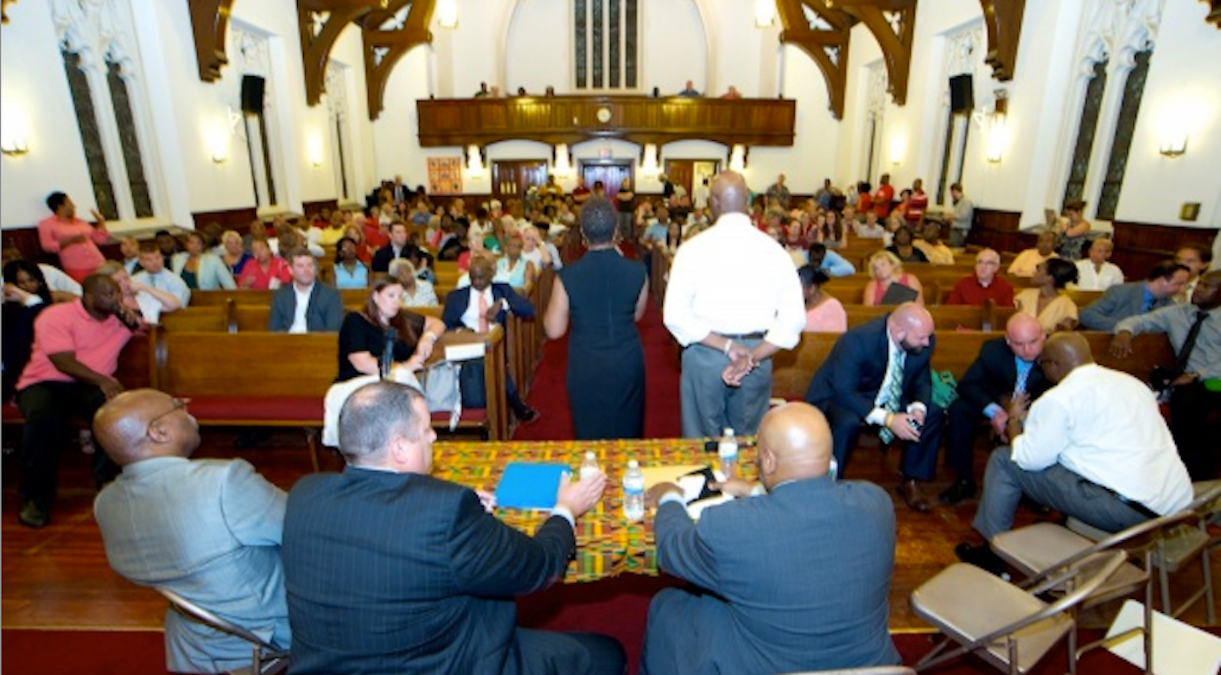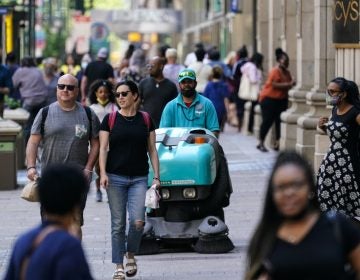Germantown vs. Camelot: A former GHS teacher’s take

At a July meeting, state Rep. Stephen Kinsey and City Councilwoman Cindy Bass heard from Germantowners about a proposed lease at the GHS property. (Bas Slabbers/for NewsWorks)
Hearing the rumors surrounding a possible lease agreement between the School District of Philadelphia and Camelot Schools at Germantown High School sparked an outrage in the local community.
It also outraged teachers like myself who fought so hard to keep the school open.
The following is a work of opinion submitted by the author.
Hearing the rumors surrounding a possible lease agreement between the School District of Philadelphia and Camelot Schools at Germantown High School sparked an outrage in the local community.
It also outraged teachers like myself who fought so hard to keep the school open.
After teaching at Germantown High School for two years, being heavily involved with advising the Future Business Leaders of America program and coaching baseball, Germantown became my community.
By advocating for Germantown to stay open and rallying at the School Reform Commission’s meetings, I experienced firsthand the powerful dynamic of a diverse community sharing common interests.
The battle’s chronology
Although the end result of the SRC meeting was a shot to Germantown’s heart, the advocates and passionate community stakeholders did not give up.
As summer just began, word spread of Camelot’s interest in the newly vacated GHS building. There was a community meeting in a nearby church hosted by Germantown’s state representative and city councilwoman along with a panel of Camelot executives.
This community meeting showcased the strength of the Germantown voice, and I heard an overwhelming sense of opposition to the Camelot program moving in.
With more than 150 community stakeholders in attendance, many questions were asked regarding Camelot’s legitimacy, track record and what they could offer the community.
From start to finish, the common voice was clear: Camelot moving into Germantown would be a rushed decision that would benefit neither students nor the local community.
Jarring realizations
During this meeting, many startling findings came to fruition from the community, teachers, elected officials and Camelot representatives.
First, Camelot was touting their success of unverified graduation rates and great programs. However, they had no comparable academic record as their PSSA/Keystone scores count for their students’ home neighborhood school.
Next, as one community activist put it, “nobody who buys a car settles for the first offer.” In other words, it is unwise for a corporation to be banking on one building for their three programs just as it would not be wise for the School District to lease out the property without knowing the true value by fielding other offers.
Furthermore, Camelot executives were not able to answer questions about how much the lease would cost or any additional costs for that matter: utilities, repairs, retrofitting the building, additional staff etc.
It was alarming how little the Camelot officials knew, and how little they prepared.
Camelot projected an enrollment of 500-800 students for the 2013-2014 school year. This number is the sum of their programs that would all be housed in Germantown.
Many questions at the first community meeting noted this number. How can you close a school for under-enrollment with data supporting how underutilized the space is, then offer Camelot a lease with a similarly projected enrollment? Research supported how Germantown is fit for more than 1,400 students, which is closer to an ideal number.
Proposals were not considered to convert GHS into a K-12 school or move local magnet schools back into the property which would reach the buildings enrollment potential.
Other ideas that were tossed around were housing the Camelot program in Germantown as long as the neighborhood high school can coexist similar to programs in Olney Charter and Mastery Gratz.
Fiscal woes
Camelot also noted their lack of financial support as the main reason for losing their leases — not Germantown’s fault, but maybe a Camelot strategy to showcase a need for a new location — as their per-student expenditure is thousands less than the School District’s.
Camelot would be provided only $8,750 per student compared to more than $12,000 for the district schools.
This raised eyebrows as the amount of money would be significantly less considering rent, books, extra staff, building repairs, gas/water/electric, moving and transition fees would all be subtracted from this measly per student expenditure.
Properly educating students in Philadelphia with more than $12,000 is difficult enough, but at least these students don’t have rent, operations and new deductions being removed from that tally.
Camelot’s are mostly high-need, high-support students. It brought up many questions as to the legitimacy of their quality of education since their budgets have been thinning over the years.
On a personal note, I interviewed at Camelot and took graduate courses with its teachers. When just having students seated for the duration of a class is a “good day at Camelot,” I question the education.
I completely understand the circumstances of having a tight budget and high-needs students, but how can students reach their potential if they are not allowed to bring school bags or backpacks to school. How can they do their homework?
Opposition forms
The aforementioned reasons persuaded the Germantown community to openly oppose this proposal.
During the community meeting, the room was lopsidedly divided. There were fewer than 10 Camelot supporters (many employees and families of their students) and more than 100 objecting to the proposal.
After the meeting, I made it a point to stick around to speak with Councilwoman Cindy Bass and state Rep. Stephen Kinsey who would be creating a document indicating their and the community’s stance on Camelot moving into Germantown.
I broached a simple but important topic with the eighth district councilwoman:
“I am worried that the document being sent to the SRC will not accurately capture the community’s concern and opposition. I am concerned this proposal will still be made regardless of what happened tonight.”
She explained that the community’s feedback will be brought to the table, but said it may not be enough. She then asked me, “Where was this support when they were trying to close your school?” That was a great question to divert me from my original concern.
She said there would be another community meeting for the agreed-upon community leaders representing the organizations and community groups. However, this meeting was by invite only. I asked to attend as a teacher representative and was denied.
Secrecy leads to distortion
A week later, the exclusive community meeting took place.
Without knowing what happened, who was in attendance or any outcomes, the Germantown community was left in the dark.
We then found out that the elected officials were working on the proposal for the SRC backing Camelot’s lease with the support of the community.
My premonition proved true and the outrage ensued on the education-outlet messageboards and Twitter. The community felt betrayed, and had even more questions.
Some comments linked this case to politicians’ votes being purchased or of backroom deals between Camelot, the district and the elected officials that crushed the Germantown community.
Where I went from there
Feeling defeated, I was not sure what else could be done in order to prevent Camelot from moving into the 99-year-old GHS building.
I began to look at the positives, and agreed that any tenant would be better than an empty massive property.
But, the only next step I could come up with was speaking on behalf of the community at the SRC meeting in which this proposal would be voted on.
I thought this would be on Aug. 22, the day of the PFT rally through Center City, but fortunately found out that Camelot would NOT be moving into Germantown, and that it would take months for the district to inspect the building in order to find it safe and suitable for Camelot.
They closed my school and they laid me off, but they didn’t take my passion for education in Philadelphia and the Germantown community.
By no means does this rule out a Camelot GHS lease in the near future. However, there will now be time for the district to field other offers, evaluate repair needs, value the property and, hopefully, find a better alternative than Camelot.
Although this victory may be short-lived, I urge the Germantown community to propose other options for Germantown High School that would benefit the community.
Whether it is a district run program or school, a community center or even a new college campus, decisions need to involve the community and representatives need to back these.
David A. Lewandowski taught at Germantown High School for two years during which he advised the Future Business Leaders of America program and coached baseball. A certified Secondary Mathematics and Business, Computer and Information Technology (BCIT) teacher, the Northeast Philadelphia native is “still laid off, waiting to hear back from the district.”
WHYY is your source for fact-based, in-depth journalism and information. As a nonprofit organization, we rely on financial support from readers like you. Please give today.




